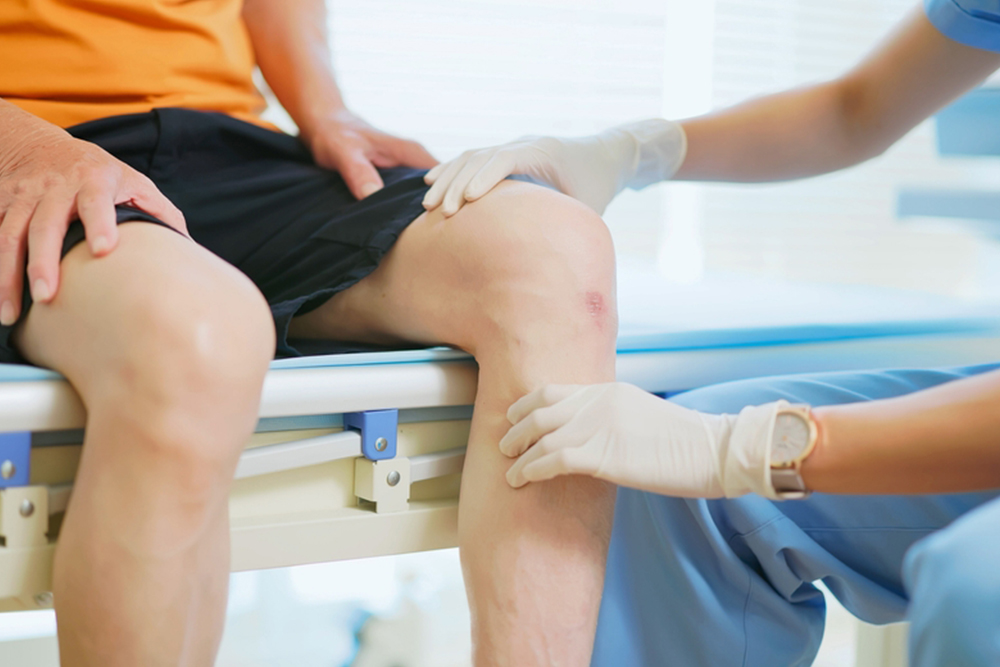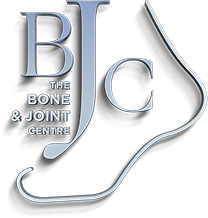
What is the Meniscus?
The meniscus is a C-shaped piece of tough, rubbery fibrocartilage located in the knee. It plays
a crucial role in distributing stress across the knee joint during weight-bearing activities,
acting as a shock absorber between the shinbone (tibia) and the thigh bone (femur).
In each knee, you have two menisci. One, known as the medial meniscus, is located on the inner
side of your knee, and the other, known as the lateral meniscus, is on the outer side. These
menisci work together to enhance the stability of the knee joint, helping to balance your weight
evenly across the knee and providing a smooth surface for the bones to move on.
While the menisci are durable and resilient, they can be damaged or torn; resulting in pain and
limited mobility.
What is a Meniscus Tear?
A meniscus tear is a common knee injury, particularly among athletes and older adults. This occurs
when the tough, rubbery fibrocartilage (the meniscus) that cushions and stabilises the knee
joint, becomes damaged or torn. Meniscus tears can be caused by direct impact or torque to the
knee, particularly when it is bent or twisted. In athletes, this can happen during contact
sports or activities requiring sudden turns or pivots.
However, meniscus tears are not solely limited to athletes or those engaged in physically
demanding activities. For older adults, age-related wear and tear significantly contributes to
the likelihood of developing a torn meniscus. As we age, our cartilage weakens and thins out,
making the meniscus more susceptible to tearing, even from minor injuries or everyday movements.
What are the Symptoms of a Meniscus Tear?
A meniscus tear is characterised by pain, stiffness, and a popping sensation at the time of injury. However, the severity and nature of symptoms can vary depending on the severity and location of the tear.
Common symptoms include:
- Pain when twisting or rotating the knee
- Swelling or inflammation in the knee, building up over 2 to 3 days following the injury
- Limited range of motion in the knee
- Difficulty straightening the knee
- A sensation of the knee "locking" or getting stuck in one position
- The knee feels unstable or giving way, particularly when bearing weight
It is important to note that not all meniscus tears are evident immediately after the injury. In some cases, symptoms may only manifest several days later.
If you notice any of these symptoms, consult a meniscus doctor for a prompt diagnosis and treatment. Our specialist clinic can be reached at 9898 7781.
What are the Risk Factors of a Meniscus Tear?
- Participation in sports – Engaging in contact sports or activities that entail vigorous knee movements, such as squatting, twisting, and pivoting, raises the risk of meniscus tears. Sports like football, basketball, and soccer, among others, fall under this category.
- Age – Ageing naturally leads to wear and tear of the knee joint, including the meniscus. This degeneration makes the meniscus more prone to injuries, even from minor strain or impact.
- Osteoarthritis – Osteoarthritis, a condition that causes the cartilage in the joints to wear down, can increase the likelihood of meniscus tears. In osteoarthritic knees, the cartilage, including the meniscus, becomes thinner and less resilient, making it more susceptible to tearing.
- Trauma – Traumatic incidents, such as direct hits to the knee during sports activities or car accidents, can cause acute meniscus tears.
What are Possible Complications of a Torn Meniscus?
If a torn meniscus is not promptly treated, it can cause persistent knee pain, changes in gait,
and knee instability. The meniscus plays a critical role in stabilising the knee joint, and
damage to this cartilage can lead to a sense of the knee giving way during weight-bearing
activities.
An untreated torn meniscus can also increase the risk of developing osteoarthritis in the
affected knee over time. Osteoarthritis occurs when the protective cartilage that cushions the
ends of your bones wears down, leading to joint pain and stiffness.
In other cases, an untreated meniscus tear can also result in a locked knee as pieces of the
torn meniscus can move into the joint space. A locked knee renders one unable to fully
straighten the knee, or experience a substantially reduced range of motion.
How are Meniscus Tears Diagnosed?
Meniscus tear treatments range from conservative treatments to surgical interventions, depending on the severity and type of tear, the patient's overall health, and their activity level.
- Medical history review – A consultation typically begins with a review of the patient’s medical history and symptoms. The doctor may ask if the patient has had any previous knee issues, partakes in high-risk activities that could lead to a knee injury, or if there is a family history of knee problems.
- Physical exam – The doctor will also conduct a visual and physical examination of the knee joint. This involves assessing the joint for signs of discomfort, swelling, tenderness, and limited mobility.
- Imaging tests – In order to rule out other injuries and accurately pinpoint the location and severity of the injury, the doctor may order imaging tests such as X-rays, computed tomography (CT) scans, or a magnetic resonance imaging (MRI).
- Arthroscopy – In some cases, a doctor may perform an arthroscopy. This minimally invasive procedure involves inserting a thin instrument equipped with a light and camera into the knee joint through a small incision. This allows the doctor to directly examine the interior of the knee and assess for cartilage damage.
How is a Meniscus Tears Treated?
The treatment for meniscus tears will depend on the severity of the injury, and range from conservative treatments to surgical interventions.
Non-surgical Treatments for Meniscus Tears
In mild cases, or initially, doctors may recommend conservative treatments such as:
- RICE (Rest, Ice, Compression, Elevation) – This is a common initial line of treatment that aids in reducing pain, swelling and preventing further injury to the knee.
- Medications – Pain medications and anti-inflammatory medications can help to alleviate pain and swelling.
- Physiotherapy – This involves special exercises that are tailored to improve strength and stability of the knee, as well as restore range of motion.
Surgical Treatments for Meniscus Tears
If conservative treatments do not prove effective, meniscus surgery will be considered. This includes:
- Arthroscopic meniscus surgery – This procedure uses a small camera and specialised surgical tools, inserted through tiny incisions, to visualise and access the knee joint. This allows the orthopaedic surgeon to repair the tear or trim the damaged tissue in a minimally invasive way.
- Meniscal repair – In cases where the tear is repairable, the surgeon may opt to sew the torn edges back together.
- Meniscus transplant surgery – For severe meniscus tears, the damaged meniscus may be replaced with a healthy one from a donor. This procedure aims to restore the natural function of the meniscus in the knee joint.
- Partial meniscectomy – This is performed when only part of the meniscus is damaged. Here, the surgeon removes the torn portion and preserves as much of the original tissue as possible.
How Long Does Recovery Take?
Most patients can expect to recover daily function within six weeks to six months post-surgery. This will depend on the patient’s age, activity level, severity of injury, type of meniscus surgery performed performed, and proper adherence to rehabilitation.
How Can a Meniscus Tear be Prevented?
While it is not always possible to prevent injuries like a meniscus tear, certain measures can reduce the risk of developing them:
- Wear appropriate footwear – Proper shoes tailored to the specific activity or sport can provide necessary support and stability to the foot and ankle. This helps in maintaining proper leg alignment and knee positioning, reducing stress on the meniscus.
- Use of protective gear – Wearing knee braces or knee guards can be beneficial, particularly for those with weak or unstable knees or during high-intensity activities.
- Proper warm-ups and cool-downs – Always take the time to warm up before any strenuous activity and cool down afterwards. This helps to condition your body, specifically your knees, thereby reducing the risk of injury.
- Strengthen supporting muscles – Strengthening leg muscles that support the knees, including quadriceps, hamstrings, and calves, is crucial. Strong muscles can better support and protect the knee joint, mitigating the risk of a tear.
- Conditioning of core and hip muscles – Strengthening the muscles in the hips, buttocks, and core can improve overall stability and balance, reducing the likelihood of knee injuries.
- Rest when needed – Avoid over-exertion by knowing your limits and taking sufficient breaks between workout sessions or games.
- Maintain a healthy weight – Carrying excess weight places additional stress on your knees and can increase the risk of a meniscus tear.
FAQs
Can a torn meniscus heal on its own?
While mild meniscus tears can sometimes heal with time, complex or large tears typically require medical intervention. It is recommended to visit a meniscus specialist to determine the best course of treatment as early as possible.
Can you still walk with a torn meniscus?
The Bone and Joint Centre offers personalised and effective meniscus tear treatment in Singapore. Contact us at 9898 7781 today to schedule an appointment..
Our orthopaedic specialist is widely recognised in his field to skilfully diagnose & treat your injury or condition so you can emerge stronger and safely return to the activities you enjoy.
For more information, please call 9898 7781 or click here to send us an email
We want to assure you that we remain committed to providing the high quality and compassionate care you have come to expect from us. For more assistance, please call us at 9898 7781 or fill up the form below and we will get back to you as soon as possible.

3 Mount Elizabeth, #14-15,
Singapore 228510
| Tel | : +65 6970 5905 |
| Fax | : +65 6970 5906 |
| Mobile | : +65 9898 7781 |
: hello@bjc.sg, |




